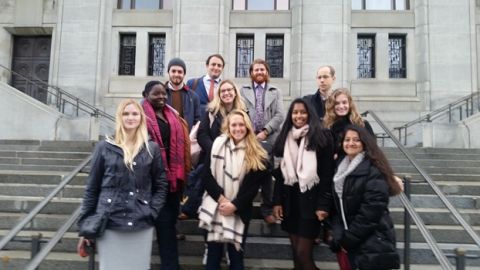
Dispatching a bus to Ottawa on November 6, Queen’s Law gave its students a ticket to watch the hearing of perhaps the highest-profile case before the Supreme Court of Canada (SCC) in 2017. The case, Groia v LSUC, was an appeal of sanctions leveled against Toronto lawyer Joseph Groia by the Law Society of Upper Canada (LSUC) for incivility during his successful defense of John Felderhof, then VP of Exploration for Calgary-based public mining company Bre-X Minerals.
“Groia v LSUC is important from a broad Canadian legal perspective,” says Thomas Harrison, Law’01, PhD’16 (Artsci’89, BEd’92), a legal ethics instructor and the faculty representative for the field trip. “It refines the limits of the independence of the Bar, including duties of lawyers and the role of law societies,” he says. “It has a bearing on the question of regulation of lawyers’ behaviour, access to justice, rule of law and setting precedents for down the road.”
In addition to the case content, exposure to the different advocacy styles made for a valuable learning experience. “It was good for students to get a sense of the aura of the court and its majestic setting,” says Harrison. “They were interested in the impression of advocacy and effectiveness of arguments.”
The hearing was the latest chapter stemming from the decades-long saga concerning the largest mining scandal in history, in which Indonesian land owned by Bre-X was reported to hold $6 billion in gold deposits – a claim discovered as false in 1997, when uncovered that gold was planted on stone samples in a method known as “salting.” Bre-X’s subsequent stock collapse triggered civil lawsuits and criminal investigations worldwide, and the affair garnered widespread media attention, even inspiring the 2016 film Gold starring Matthew McConaughey.
In May 1999, Felderhof was charged by the Ontario Securities Commission (OSC) with fraudulently trading in Bre-X stock and participating in misleading press releases. The trial was protracted and rancorous, being suspended in April 2001, when the OSC attempted to remove presiding judge, Justice Peter Hryn, for alleged bias against the prosecution. The request, and its appeal, both failed. The trial resumed in 2005 and then in 2007 Felderhof was famously acquitted in a 600-page decision.
The LSUC, the body regulating Ontario lawyers, sanctioned Groia for “incivility,” which resulted in a one-month suspension and a fine of over $200,000 to be served and paid if he was to lose at the SCC hearing, where legendary Toronto litigator Earl Cherniak would make final arguments on his behalf.
The LSUC’s sanction has been highly controversial, attracting criticism from Canadian commentators across the country for the potentially injurious and ominous ramifications it poses on judicial independence, what it means to be a lawyer, restrictions on a lawyer's duty of resolute advocacy, and appropriate advocacy techniques. In 2013, Law’78 alumnus Justice Norman Boxall (Ontario Court of Justice), then-President of the Criminal Lawyers’ Association, slammed the sanctions for their “potential chilling effect upon defense counsel.”
The SCC hearing therefore generated a large national profile, evident by the fact that it garnered vigorous questioning by the SCC Panel, and had no fewer than 14 interveners, including, the Law Society of Saskatchewan, the Federation of Law Societies of Canada, the Canadian Bar Association and the Bar of Quebec, amongst others.
A month before the hearing, Professor Arthur Cockfield, Law’93, hosted Groia to guest lecture in his legal ethics class to discuss the case, which made the field trip an opportunity for the students to witness closure on a matter they had become intimate with. Harrison reports that Groia at one stage even visited them at their seat in the courtroom. “I’m broadly sympathetic to the appellant for several reasons,” says Harrison. “The regulatory sanctions shouldn’t be upheld. The standards for which he was sanctioned are unclear, and in any event, beyond the jurisdiction of the provincial law society.”
Chris Sullivan, Law’20, attended the hearing and found it contributed greatly to his in-class learning. “I think the trip provided an excellent opportunity to learn about the application of several of the topics touched upon in public and constitutional law,” says Sullivan, who avidly absorbed both the application of precedent and the procedures and expectations when appearing before the SCC.
When asked for his key take-aways, Sullivan first notes the importance of being prepared for the court. “As simple as this sounds, several of the lawyers present seemed unprepared to answer the questions put to them by the judges.” Second is the substantive issue of the tension between “zealous” advocacy on the one hand and decorum on the other. “This strikes to the heart of an adversarial court system that itself is controversial to some and raises the question of what it means to be adversaries in a courtroom,” he says. “Like so many things, it seems to be about identifying the line that achieves a balance between those two competing interests.”
Julianne Hoekstra, Law’19, another attendee, believes there is great utility in witnessing a case like this first-hand. “Hearing submissions was much better than reading about them in class. Firstly, you get to hear the passion of the advocates and what points are actually most important to their argument can be identified by their tone. Secondly, you get to hear all submissions and answers to questions, as opposed to what is just quoted from their factums in the written judgements. It’s also interesting to hear the points on which the judges engage.”
Thomas Harrison agrees. “The strength of personal advocacy gives life to the case it wouldn’t otherwise have by just reading, and helps you understand that oral persuasion is one of the most important skills for advocates,” he adds. “I think it’s a good idea for us to do more trips like this in the future.”
By Aschille Clarke-Mendes